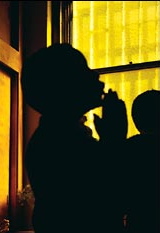Why do you write and use written prayers I was asked at a recent workshop? Aren’t said prayers dead prayers? Aren’t spontaneous prayers the only living prayers? Isn’t the Bibe the only acceptable written word to be studied, memorized and quoted?
These are important questions that all of us need to think about as we shape our prayer life. I grew up thinking that spontaneous prayers were the only acceptable form of prayer. After a while I noticed that some of these prayers were rambling, unfocused and a little like the babbling of a child – without real meaning or purpose. At first it didn’t seem to matter. Speaking in tongues reinforced this. Praying without understanding was seen as a mark of deep spirituality, but it wasn’t always satisfying.
Praying the psalms helped, but I realized there are other prayers that can be just as relevant and enriching. I slowly started adding written prayers and liturgies, some of them hundreds of years old, to my prayers. Their meaning resonated in my heart and my prayer life took on new meaning. Then I started adapting these to better meet my own needs and finally I started writing my own.
I love the times when spontaneous prayers bubble up from within me. I still love to speak in tongues, but there are times when prayers written by others are more powerful than anything my mind can produce. This is particularly true when I am grappling with pain and suffering, disaster and disease. The pain in my heart seems to incapacitate my mind. Grasping for the words that others have written is the only appropriate offering to God.
There are other times when writing and reciting my own prayers is even more enriching. Especially when I want to establish a new habit, I find that writing prayers I then recite to remind me of that habit helps move it into my heart. Like this prayer I wrote a couple of years ago when I was trying to establish boundaries in my life:
God may I live within limits,
Of my body, my mind, my spirit.
God may I live within limits,
Of my calling ,my community, my capacity.
God may I live within limits,
Of who I am, and who you call me to be.
Said prayers and spontaneous prayers can both be dead prayers and they can both be living prayers. It is how we use them that breathes life into the words we say and personally I think that variety is the spice of life – a spontaneous prayer here, a written liturgy there, an ancient prayer somewhere else. All have their place and I encourage you to experiment.


10 comments
I have found written prayers often touch me at a deeper level and enable me to draw closer to God. God has gifted some people with a beautiful use of words that enrich my life and journey with God. Thanks Christine, your prayers have touched my heart. You are a blessing.
Thanks Beth – and I agree wholeheartedly. written prayers have touched me deeply too. They are often the ones that resonate in my heart and come back to consciousness when I need them
Well said! I still pray spontaneous prayers but I have found my prayer life being enriched after I began including written prayers in my prayer time.
Amen
I agree with everything that you have said and with the comments. Additionally, I have found the power of using the old, old, written prayers with the elderly and those struggling with dementia. Starting the Lord’s Prayer or the 23rd Psalm and having a person who is otherwise non-communicative start to recite the Psalm with me reminds me of the power of these old, written and learned prayers. What a gift they are. May these precious words sink deep roots into my heart as they have into so many others.
Coe, that is a wonderful thought and I suspect that sometimes those prayers will connect to the person you are praying for in ways that spontaneous prayers never could
Great post. In the last several years of my Christian life, I’ve come to the same conclusion: “Said prayers and spontaneous prayers can both be dead prayers and they can both be living prayers.” I had a post on it. Like you, I used to think ONLY spontaneous, personal prayers were okay. But you are so right that they can be rambling, unfocused and a little like the babbling of a child – without real meaning or purpose. NT Wright has some good thoughts in one of his books (Simply Christian) encouraging the use of formal prayers.
Thanks Laura – of course NT Wright is an Anglican bishop & therefore some people would dismiss what he says about formal prayers on that basis alone. However I see more and more of my evangelical friends recognizing the richness of set prayers. It is wonderful.
Will you explain the term “dead prayers”? I’ve never heard of this.
Dead prayers means that they have no power to connect us to God or to bring about change. In other words God doesn’t really listen to them.